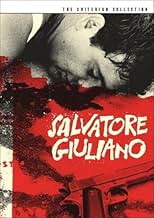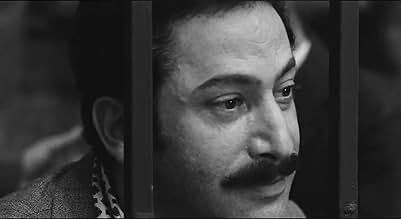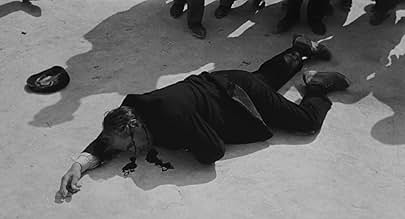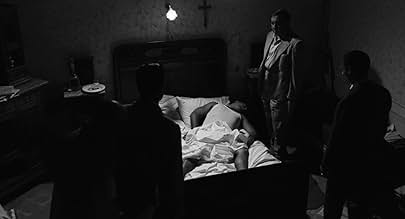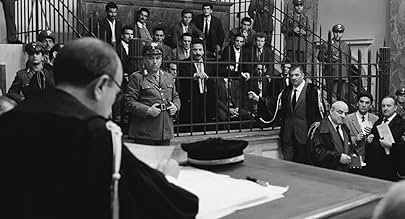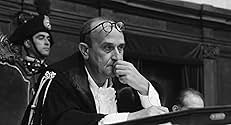PUNTUACIÓN EN IMDb
7,3/10
4,5 mil
TU PUNTUACIÓN
Los turbios y complicados vericuetos entre el poder gubernamental, el partido independentista y la Mafia en la Sicilia de los años 40 culminan con la muerte de Salvatore Giuliano.Los turbios y complicados vericuetos entre el poder gubernamental, el partido independentista y la Mafia en la Sicilia de los años 40 culminan con la muerte de Salvatore Giuliano.Los turbios y complicados vericuetos entre el poder gubernamental, el partido independentista y la Mafia en la Sicilia de los años 40 culminan con la muerte de Salvatore Giuliano.
- Premios
- 6 premios y 4 nominaciones en total
Frederico Zardi
- Pisciotta's Defense Counsel
- (sin acreditar)
Pippo Agusta
- Minor Role
- (sin acreditar)
Sennuccio Benelli
- Reporter
- (sin acreditar)
Giuseppe Calandra
- Minor Official
- (sin acreditar)
Pietro Cammarata
- Salvatore Giuliano
- (sin acreditar)
Max Cartier
- Francesco
- (sin acreditar)
Nando Cicero
- Bandit
- (sin acreditar)
Pietro Franzone
- Seperatist
- (sin acreditar)
Giovanni Gallina
- Bit Part
- (sin acreditar)
Vincenzo Norvese
- Bit Part
- (sin acreditar)
Carmelo Oliviero
- Don Nitto Minasola
- (sin acreditar)
Renato Pinciroli
- Pinciroli
- (sin acreditar)
Francesco Rosi
- Narrator
- (voz)
- (sin acreditar)
Giuseppe Teti
- Priest of Montelepre
- (sin acreditar)
Cosimo Torino
- Frank Mannino
- (sin acreditar)
Argumento
¿Sabías que...?
- CuriosidadesMartin Scorsese credits this film as being one of his many inspirational sources for the look and style of his Taxi Driver (1976).
- PifiasWhen his mother comes to view and identify his corpse, Salvatore's stomach clearly moves as the actor struggles to control his breathing.
- ConexionesEdited into La piedra en la boca (1970)
Reseña destacada
Filmed in the actual Siciilian locations, this film is a fair attempt to strip away the myth surrounding bandit-cum-revolutionary Giuliano. In fact, he doesn't appear except as a gunned-down corpse at the beginning. The film winds back to unravel the events leading to his death, and forwards to its consequence. This is a clever method of achieving objectivity while at the same time subtly emphasising the man's elusive and mysterious qualities. To show Giuliano would have either been either hagiography or iconoclasm. The film rose above that and broadened its inquiry into the wider social and political context, effectively belittling him as the puppet of various forces jostling for position in Sicily after the war: bandits, police, local aristocracy, the Italian government, communists, and the Mafia.
This sets quite a challenge for itself, partly because of the vacuum at its centre, partly because of the obscurity and complexity of the real events. We are delivered to a chaotic courtroom to try to piece it together. The film finally latches onto Giuliano's lieutenant the only one who seems to know something of what is going on - but even he is silenced. It's all the more disturbing for the confusion.
Rosi is one of the best directors of crowds scenes and he gives raucous energy to any gathering of men, especially in the courtroom. He induces a kind of group hysteria in his actors; they are totally unaware of the camera and the result is an almost disturbing hyper-real feel (real crowds are dull in comparison) it's really something to appreciate. To get into this film, you need to invest something in the passions of the various parties involved - if not sympathise with them, then at least understand them. Without this, the danger is that it all boils down to so much petty bickering. The same might be said of the Godfather, which clearly owes a huge debt to Rosi's style.
Influential then, somewhat brave, with some fine directorial moments, and an interesting history lesson. Hard to actually like, but hard not to admire.
This sets quite a challenge for itself, partly because of the vacuum at its centre, partly because of the obscurity and complexity of the real events. We are delivered to a chaotic courtroom to try to piece it together. The film finally latches onto Giuliano's lieutenant the only one who seems to know something of what is going on - but even he is silenced. It's all the more disturbing for the confusion.
Rosi is one of the best directors of crowds scenes and he gives raucous energy to any gathering of men, especially in the courtroom. He induces a kind of group hysteria in his actors; they are totally unaware of the camera and the result is an almost disturbing hyper-real feel (real crowds are dull in comparison) it's really something to appreciate. To get into this film, you need to invest something in the passions of the various parties involved - if not sympathise with them, then at least understand them. Without this, the danger is that it all boils down to so much petty bickering. The same might be said of the Godfather, which clearly owes a huge debt to Rosi's style.
Influential then, somewhat brave, with some fine directorial moments, and an interesting history lesson. Hard to actually like, but hard not to admire.
- federovsky
- 20 dic 2008
- Enlace permanente
Selecciones populares
Inicia sesión para calificar y añadir a tu lista para recibir recomendaciones personalizadas
- How long is Salvatore Giuliano?Con tecnología de Alexa
Detalles
- Fecha de lanzamiento
- País de origen
- Idioma
- Títulos en diferentes países
- Wer erschoß Salvatore G.?
- Localizaciones del rodaje
- 98 Via Serafino Mannone, Castelvetrano, Trapani, Sicily, Italia(Giuliano's body)
- Empresas productoras
- Ver más compañías en los créditos en IMDbPro
- Duración2 horas
- Color
- Mezcla de sonido
- Relación de aspecto
- 1.85 : 1
Contribuir a esta página
Sugerir un cambio o añadir el contenido que falta

Principal laguna de datos
By what name was Salvatore Giuliano (1962) officially released in Canada in English?
Responde
